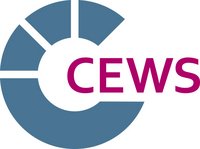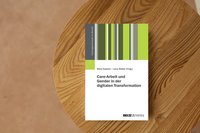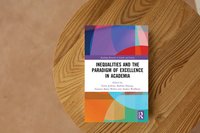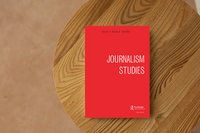Liebe Leser*innen, Sommerzeit = Ferienzeit = Urlaubszeit = Sommerloch?
Diese Gleichung gilt in der warmen Jahreszeit häufig und führt dazu, dass Newsletter wie der vorliegende in den Sommermonaten meist nur spärlich gefüllt sind. Doch ganz anders die Juli-Ausgabe des gesis reports: Zahlreiche Neuigkeiten künden von der emsigen Arbeit unserer Mitarbeitenden und von den Aktivitäten im und außerhalb des Instituts. Von Sommerloch keine Spur... Viel Freude bei der Lektüre wünscht Ihnen Das Redaktions-Team | Dear readers, Summertime = vacation time = summer slump?
This equation often applies during the warm season and leads to the fact that newsletters such as this one are usually sparsely filled during the summer months. But the July issue of the gesis report is quite different: Numerous news items tell of the busy work of our staff and of the activities in and outside the institute. No sign of a summer slump... We hope you enjoy reading this issue Your editorial team |
GESIS Spring Seminar 2023 – Save the Date The GESIS Spring Seminar offers high-quality training in state-of-the-art techniques in quantitative data analysis taught by leading experts in the field. In 2023, all courses will deal with "Modeling Group Differences" in the social sciences and beyond. It targets advanced graduate or PhD students, post-docs, and junior and senior researchers. Lectures in each course are complemented by extensive hands-on exercises and tutorials. All courses are held in English. The Spring Seminar will take place from 27 February to 17 March 2023 — either at the GESIS premises in Mannheim or Cologne. Registration will be open in October and then announced in the Training newsletter! On the website, you will then find detailed course descriptions and will be able to register for the courses.
GESIS Summer School in Survey Methodology 2022 – Last Call for Registration The GESIS Summer School 2022 will take place from 03 to 26 August 2022. The Summer School will be organized as a hybrid event: Some courses will be held on-site at an external venue in Cologne, and some online via Zoom. Below you will find some selected courses from this year's program — each with a couple of places available:
GESIS Fall Seminar in Computational Social Science 2022 – Still Places available! The Fall Seminar will take place from 5 to 23 September 2022 at GESIS in Mannheim. Week 1 (5-9 September) comprises courses on the foundations of working with digital behavioral data. Courses in Week 2 (12-16 September) focus on the collection and management of big data, and courses in Week 3 (19-23 September) cover different techniques for analyzing these data.
| GESIS Training
Workshops 31/08 - 01/09/2022
R 101 (Online) 31/08 - 01/09/2022
Python 101 (Online) 07/09 - 09/09/2022
Mehrebenenanalyse mit Stata (Köln) 22/09 - 23/09/2022
Einführung in die Qualitative Inhaltsanalyse (Online) 06/10 - 07/10/2022
Using smartphone sensors, apps, and wearables (Mannheim) |
 | Datenreport Geschlechtergleichstellung in Hochschulgremien ist erschienen Fast 40 Prozent der Senatsmitglieder und der Mitglieder in Hochschulräten sind inzwischen Frauen. Dagegen sind Frauen bei der Leitung von Fakultäten und Hochschulen immer noch deutlich unterrepräsentiert. Mehr lesen...
Data report "Gender equality in university committees" (Geschlechtergleichstellung in Hochschulgremien) has been published Almost 40 percent of senate members and members of university councils are now women. In contrast, women are still significantly underrepresented in faculty and university leadership. This is shown in the data report Gender Equality in University Bodies. Read more... |
 | Die neue EASY Social Sciences zur Bundestagwahl 2021 ist erschienen Die interdisziplinäre Transferzeitschrift arbeitet in dieser Ausgabe die außergewöhnliche Bundestagswahl 2021 auf. Basierend auf den vielfältigen Daten der GLES werden retrospektiv alle wichtigen Aspekte der Wahl beleuchtet. Mehr lesen...
The new EASY Social Sciences on the Bundestag election 2021 has been published n this issue, the interdisciplinary transfer journal works through the extraordinary 2021 federal election. Based on the diverse data of the GLES, all important aspects of the election are retrospectively examined. Read more... |
 | Neue Publikation: Bruch, C. Applying the rescaling bootstrap under imputation for a multistage sampling design. Bruch, C. Applying the rescaling bootstrap under imputation for a multistage sampling design. Computational Statistics 37, 1461–1494 (2022). https://doi.org/10.1007/s00180-021-01164-6 In diesem Artikel wird eine Methode zur Varianzschätzung vorgeschlagen, die die Verwendung imputierter Werte in der Populationsschätzung bei Anwendung eines mehrstufigen Stichprobendesign berücksichtigt. Mehr lesen...
New publication: Bruch, C. Applying the rescaling bootstrap under imputation for a multistage sampling design. Bruch, C. Applying the rescaling bootstrap under imputation for a multistage sampling design. Computational Statistics 37, 1461–1494 (2022). https://doi.org/10.1007/s00180-021-01164-6 This paper proposes a method for variance estimation that accounts for the use of imputed values in population estimation when using a multistage sampling design. Read more... |
| | ALLBUS 2021 publiziert! Der ALLBUS 2021 steht zum Download bereit! Leider hat die Pandemie im Jahr 2020 eine Erhebung von persönlichen Interviews unmöglich gemacht. Die Datenerhebung wurde 2021 mit über 5300 Befragten in Ost- und Westdeutschland nachgeholt – erstmalig im selbstadministrierten Mixed-Mode Design (schriftlicher Mail-Fragebogen und Online-Fragebogen). Hier geht es zum Download! Mehr lesen...
ALLBUS 2021 published! The ALLBUS 2021 is ready for download!
Unfortunately, the pandemic made it impossible to collect face-to-face interviews in 2020. The data collection was made up for in 2021 with more than 5300 respondents in East and West Germany - for the first time in a self-administered mixed-mode design (written mail questionnaire and online questionnaire). Download the data here! Read more... |
 | Neue Publikation von Christian Bruch & Barbara Felderer: Applying multilevel regression weighting when only population margins are available Christian Bruch & Barbara Felderer (2022) Applying multilevel regression weighting when only population margins are available, Communications in Statistics - Simulation and Computation, DOI: 10.1080/03610918.2021.1988642 Um Selektion in Befragungsdaten auszugleichen, werden üblicherweise Gewichtungsverfahren angewendet. Deren Nützlichkeit hängt auch davon ab, ob Bevölkerungsinformationen zu den Gewichtungsvariablen als gemeinsame Verteilungen aller Merkmale oder nur als Randverteilungen der einzelnen Merkmale verfügbar sind. Mehr lesen...
New publication by Christian Bruch & Barbara Felderer: Applying multilevel regression weighting when only population margins are available Christian Bruch & Barbara Felderer (2022) Applying multilevel regression weighting when only population margins are available, Communications in Statistics - Simulation and Computation, DOI: 10.1080/03610918.2021.1988642 Reliable survey data is needed to be able to infer survey findings to the general population. However, self-selection or panel attrition of the survey respondents may bias survey estimations. To tackle these challenges, weighting adjustments have been established to correct for different inclusion probabilities and to reduce bias in the survey. Read more... |

| Sammelband zu Care-Arbeit und Gender in der digitalen Transformation erschienen Mara Kastein / Lena Weber (Hrsg.): Care-Arbeit und Gender in der digitalen Transformation Arbeit und Fürsorge in der digitalen Transformation, Reihe: Arbeitsgesellschaft im Wandel 2022. Dr. Lena Weber, Leiterin des CEWS, ist eine der Herausgeberinnen des Sammelbandes, der sich mit dem wechselseitigen Spannungsverhältnis zwischen digitalisierter Erwerbsarbeit, Fürsorgetätigkeiten und Geschlechterverhältnissen auseinandersetzt. Mehr lesen...
Anthology on care work and gender in the digital transformation published Mara Kastein / Lena Weber (Eds.): Care-Arbeit und Gender in der digitalen Transformation Arbeit und Fürsorge in der digitalen Transformation, Reihe: Arbeitsgesellschaft im Wandel 2022. Dr. Lena Weber, Director of CEWS, is one of the editors of the anthology, which deals with the mutual tension between digitalized gainful employment, care activities and gender relations. Read more... |
 | Wie gründet man ein Forschungsdatenzentrum? Buck, D., Croisier, J., Eder, C., Hoffstätter, U., Jansen, M., Meyermann, A., & Pascal Siegers (2022). Handreichung: Forschungsdatenzentren gründen. RatSWD Working Paper 280/2022. Berlin, Rat für Sozial- und Wirtschaftsdaten (RatSWD). doi.org/10.17620/02671.70. Die Verbesserung der Zugänglichkeit von Forschungsdaten ist derzeit ein zentrales Thema der Wissenschaftspolitik. So empfiehlt die Bundesregierung in ihrer Datenstrategie unter anderem die Stärkung der Forschungsdatenzentren (FDZ). Mehr lesen...
How to start a Research Data Centre? Buck, D., Croisier, J., Eder, C., Hoffstätter, U., Jansen, M., Meyermann, A., & Pascal Siegers (2022). Handreichung: Forschungsdatenzentren gründen. RatSWD Working Paper 280/2022. Berlin, Rat für Sozial- und Wirtschaftsdaten (RatSWD). doi.org/10.17620/02671.70. Accessibility of research data is currently a central topic of science policy. The German government, for example, recommends in its data strategy, among other measures, the reinforcement of research data centers (RDC). Read more... |
 | Leibniz im Bundestag – GESIS und HHU im Gespräch mit MdB Anke Domscheit-Berg Vor einigen Wochen hatte die Leibniz-Gemeinschaft zum alljährlichen Austausch zwischen Wissenschaft und Politik geladen. Im Rahmen der Reihe „Leibniz im Bundestag (LiB)“ nahm auch Prof. Dr. Stefan Dietze, wissenschaftlicher Leiter der GESIS-Abteilung Knowledge Technologies for the Social Sciences, gemeinsam mit Prof. Frank Marcinkowski und Christian Koß von der Heinrich-Heine-Universität Düsseldorf am Online-Event teil. Gemeinsam tauschten sie sich mit MdB Anke Domscheit-Berg, u.a. digitalpolitische Sprecherin der Linken im Bundestag, zum Einsatz von Künstlicher Intelligenz (KI) in der Politik aus. Mehr lesen...
Leibniz in the Bundestag - GESIS, HHU and MdB Anke Domscheit-Berg talk about AI A few weeks ago, the Leibniz Association hosted the annual exchange between science and politics. As part of the "Leibniz in the Bundestag (LiB)" series, Prof. Dr. Stefan Dietze, scientific director of the GESIS Knowledge Technologies for the Social Sciences department, also took part in the online event together with Prof. Frank Marcinkowski and Christian Koß from Heinrich Heine University Düsseldorf. Together, they exchanged views on the use of artificial intelligence (AI) in politics with MdB Anke Domscheit-Berg, digital policy spokesperson for the Left Party in the Bundestag, among others. Read more... |
 | Neue Publikation: Lena Weber und Kristina Binner: Excellent and Care-less?: Gendered Everyday Practices of Early Career Scholars in Germany and Austria Jenkins, F., Hoenig, B., Weber, S.M., & Wolffram, A. (2022). Inequalities and the Paradigm of Excellence in Academia (1st ed.). Routledge. doi.org/10.4324/9780429198625 Der Sammelband Inequalities and the Paradigm of Excellence in Academia untersucht die Kriterien der Exzellenz, die zu geschlechtsspezifischen Ungleichheiten im täglichen Arbeitsumfeld und bei der Bewertung von Akademiker*innen führen. Mehr lesen...
New publication: Lena Weber and Kristina Binner: Excellent and Care-less?: Gendered Everyday Practices of Early Career Scholars in Germany and Austria Jenkins, F., Hoenig, B., Weber, S.M., & Wolffram, A. (2022). Inequalities and the Paradigm of Excellence in Academia (1st ed.). Routledge. doi.org/10.4324/9780429198625 This volume examines the criteria of excellence producing inequalities of gender in the daily working environment and evaluation of academics. Read more... |
| | CESSDA Data Archiving Guide bei der IASSIST 2022 Auf der IASSIST-Konferenz 2022 hielten Libby Bishop und Yevhen Voronin von GESIS einen Workshop über den CESSDA Data Archiving Guide (DAG) - eine Ressource für Menschen, die Daten lieben. Gemeinsam mit Kolleg*innen von EKKE (Dimitra Kondyli) und SND (Ilze Lace) stellten die Referent*innen den Inhalt des DAG vor und sammelten Feedback über die Art und Weise, wie er für das Lehren und Lernen genutzt werden kann. Mehr lesen...
CESSDA Data Archiving Guide at IASSIST 2022 At the IASSIST 2022 conference, Libby Bishop and Yevhen Voronin from GESIS DSS held a workshop on The CESSDA Data Archiving Guide (DAG) – a resource for people who love data. Together with colleagues from EKKE (Dimitra Kondyli) and SND (Ilze Lace), speakers introduced the content of DAG and collected feedback on the way it can be used for teaching and learning. Read more... |
 | Neue Publikation: Kapidzic, Neuberger et al.: How News Websites Refer to Twitter: A Content Analysis of Twitter Sources in Journalism Kapidzic, S., Neuberger, C., Frey, F., Stieglitz, S., & Mirbabaie, M. (2022). How News Websites Refer to Twitter: A Content Analysis of Twitter Sources in Journalism. Journalism Studies, DOI: https://doi.org/10.1080/1461670X.2022.2078400 In einer standardisierten Inhaltsanalyse wurde die Nutzung von Twitter als zitierte Informationsquelle auf den Websites von fünf unterschiedlichen Medientypen untersucht und verglichen. Mehr lesen...
New publication: Kapidzic, Neuberger et al.: How News Websites Refer to Twitter: A Content Analysis of Twitter Sources in Journalism Kapidzic, S., Neuberger, C., Frey, F., Stieglitz, S., & Mirbabaie, M. (2022). How News Websites Refer to Twitter: A Content Analysis of Twitter Sources in Journalism. Journalism Studies, DOI: https://doi.org/10.1080/1461670X.2022.2078400 The study presents the results of a standardized content analysis comparing the use of Twitter as an information source on the websites of five news media types (quality newspapers, a tabloid newspaper, weekly magazines, broadcasters, and internet only). Read more... |
Folgen Sie uns/ Follow us!
|

